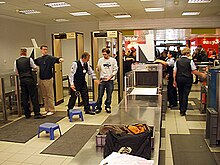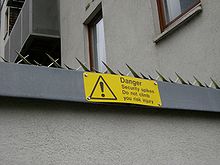Security
freedom from, or resilience against, potential harm caused by hostile forces, circumstances or disturbances
Security means to prevent dangers or losses. In general, security is similar to safety. The difference between the two is that security cares more than general safety about dangers from the outside.


Airports and banks usually have a lot of security measures. Prison security is used mainly to stop prisoners from escaping. It is also used to stop prisoners from harming prison employees or other prisoners.
Maximum security is found in or around prisons or other types of places where people need to be kept in or kept out. It is the highest security level for a building or area.
Related pages
changeReferences
change- Monahan, Torin, ed. (2006), Surveillance and Security: Technological Politics and Power in Everyday Life Archived 2011-09-07 at the Wayback Machine. New York: Routledge: ISBN 0-415-95393-6
- Operations Security Professional's Association Website http://www.opsecprofessionals.org.
Other websites
change- ISO/IEC 15443-1: Overview and framework
- ISO/IEC 15443-2: Assurance methods
- ISO/IEC 15443-3: Analysis of assurance methods
- ISO/IEC 15408[permanent dead link] refer also to Common Criteria
- ISO/IEC 17799:2005 Code of practice for information security management